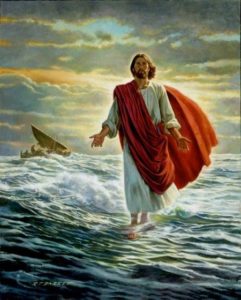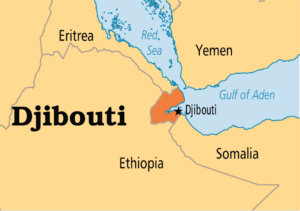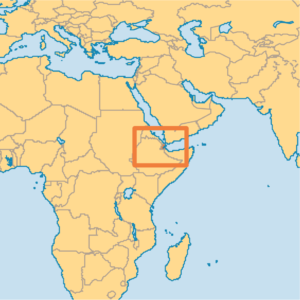TODAY’S READING FROM THE ONE YEAR BIBLE
MAY 9- 1 SAMUEL 5:1-7:17; JOHN 6:1-21; PSALM 106:13-31; PROV 14:32-33
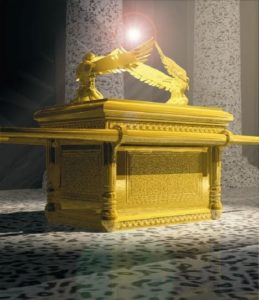 The failure of the people of God to respect all that the Ark of the covenant represented rather than the material object itself, led to their presumptuous idea that they would be victorious over their enemies, the Philistines, merely by having the Ark with them in the battle.
The failure of the people of God to respect all that the Ark of the covenant represented rather than the material object itself, led to their presumptuous idea that they would be victorious over their enemies, the Philistines, merely by having the Ark with them in the battle.
Instead, they were defeated.
They proved to be just as idolatrous as the pagan Philistines. The Philistines had their good luck charm, the lifeless idol Dagon, and the Israelites had what they presumed to be their lucky charm, the Ark of the covenant.
The Ark represented the Living God. It bore the testimony of God’s holiness. This was evident in that the Ark-chest housed the tables of stone with the decalogue (10 commandments) written upon them. It also contained the testimony of God’s authority and power (the symbol of resurrection life found in the rod of Aaron that supernaturally budded). It held the promise of covenantal blessings rather than curses (symbolized by the miraculous provision given during their wilderness wanderings- the pot of manna). The presence and power of their covenant-keeping God could be mediated to His covenant partners only through their obedient devotion, priesthood, and the provision of the required atoning sacrifices of the Tabernacle.
Now, the Ark of the covenant, taken from Shiloh, is captured by the Philistines at Ebenezer and brought to the Temple of Dagon at Ashdod.
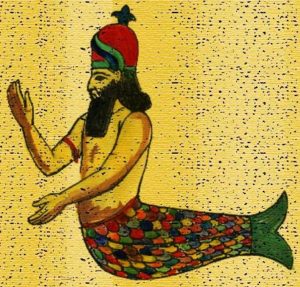 Dagon was an idol whose features were a combination of both a fish and a man. There have been discoveries of such ancient sculptures in Nineveh, Assyria.
Dagon was an idol whose features were a combination of both a fish and a man. There have been discoveries of such ancient sculptures in Nineveh, Assyria.
The Philistines were a sea people who settled along the Mediterranean coast of Palestine circa 1200 BC. Their livelihood and food were predominantly provided from the sea. The fish-man deity represented the vivifying source of fertility and prosperity to the Philistines. The Babylonians had a myth that such a being, part man, and part fish, emerged from the Erythraean Sea. They adopted the deity into its culture from the earliest days of their history.
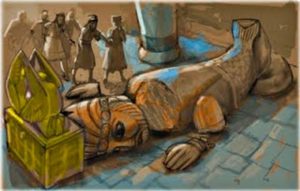 The Philistines placed the Ark of the covenant next to the statue of Dagon and left it overnight. The next day they discovered that their idol had fallen face downward on the ground before the Ark of the covenant.
The Philistines placed the Ark of the covenant next to the statue of Dagon and left it overnight. The next day they discovered that their idol had fallen face downward on the ground before the Ark of the covenant.
The supremacy of the testimony of the One True God of the Israelites over the false testimony of the idol of the Philistines was on public display, much to the embarrassment of the temple priests who immediately went to work to put the fallen statue upright once again.
 The next day the Philistines discover that their Dagon idol had fallen once again. This time the statue’s head and hands were cut off and lying on the threshold.
The next day the Philistines discover that their Dagon idol had fallen once again. This time the statue’s head and hands were cut off and lying on the threshold.
This is another foreshadowing of the gospel. The perfect testimony of God’s righteousness, almighty power, and covenant faithfulness, in Jesus Christ, will crush the head of the evil serpent, Satan (Genesis 3:15) and expose the impotence of the idols of this age (the Babylonian, Philistine, American idols, etc.) and bring them to naught. Fallen, fallen is Dagon! Fallen, fallen is Babylon the Great! (Revelation 14:8; 18:2)
Only the trunk of Dagon was left, and all those who entered the house of Dagon thereafter acknowledged this calamity by never again treading on the temple’s threshold (1 Samuel 5:5).
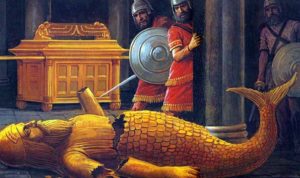 Psalm 115 describes the pitiful condition of man-made idols. “They are the work of man’s hands. They have eyes but cannot see, ears, but cannot hear…. Those who make them will become like them” (Psalm 115:5-8).
Psalm 115 describes the pitiful condition of man-made idols. “They are the work of man’s hands. They have eyes but cannot see, ears, but cannot hear…. Those who make them will become like them” (Psalm 115:5-8).
The terms of Yahweh’s covenant with the people of Israel were spelled out in terms of both blessings and curses.
The Philistines were unwittingly laying claim to the repercussions of having the Ark of the covenant in their presence without understanding Who the Covenant-keeping God was.
The Israelites experienced God’s chastisement of defeat and death at the hands of the Philistines for their disobedience to His commands. They were humiliated by the enemy’s confiscation of the Ark of the covenant. But the terms of the covenant also specified such curses as plagues for unfaithfulness.
Deuteronomy 28:58-60 58 “If you are not careful to observe all the words of this law which are written in this book, to fear this honored and awesome name, the LORD your God, 59 then the LORD will bring extraordinary plagues on you and your descendants, even severe and lasting plagues, and miserable and chronic sicknesses. 60 “He will bring back on you all the diseases of Egypt of which you were afraid, and they will cling to you.“
God, in His mercy, did not permit the plague to fall on the Israelites but instead allowed the Philistines to experience the consequences of violating His law. A plague most likely spread by rats or mice (1 Sam 6:4) caused tumors to develop on their bodies in Ashdod. Some believe this was the bubonic plague that caused painful swelling of the lymph glands, especially in the groin. Some scholars believe it was a plague of tumors and severe hemorrhoids.
The Philistines, anxious to prove that the calamity was a coincidence, and not related to the presence of the Ark, moved the Ark to the city of Gath. To their dismay, the plague broke out upon the men, young and old, in Gath also. God was vindicating the fact that He was behind the fall of Dagon! When the Philistines removed the Ark from Gath, intending to bring it to Ekron, the people of Ekron protested, recognizing that the Ark needed to be in its rightful place, or the judgment-plague of the God of Israel would fall upon them also.
The leaders go to pagan priests and diviners to determine what to do with the captured Ark of the Lord God of Israel.
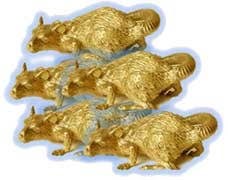 Since settling in Palestine, the Philistines established five major inland cities: Ashdod, Gaza, Ashkelon, Gath, and Ekron. Each city had its ruler, or ‘lord.’
Since settling in Palestine, the Philistines established five major inland cities: Ashdod, Gaza, Ashkelon, Gath, and Ekron. Each city had its ruler, or ‘lord.’
The diviners recommend that the Ark be returned with a guilt offering of 5 golden representations, symbolic of the plague, to turn away God’s anger– 5 golden tumors and 5 golden mice, the number 5 representing the 5 Philistine communities.
The Philistine priests instruct the leaders to put the Ark of the covenant on a cart hitched to milk cows with no experience of pulling a load. The leaderless, inexperienced, untrained milk cows carry the Ark away. The Philistine priests proclaim that if the milk cows take the Ark back to a city occupied by Israelites, these events are to be recognized as being by the hand of the God of Israel. If not, they will put all these episodes down as ‘coincidence.’
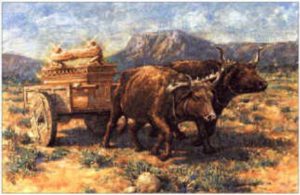 The milk cows bring the Ark directly to the city of Beth-Shemesh, not looking to the left or the right, obviously directed by a supernatural power. The Levites of Beth-Shemesh took the Ark off the cart and offered the milk cows as a burnt offering upon the fire fueled by the split wood from the ox cart they demolished. A great stone was erected to mark the occasion of the Ark’s return.
The milk cows bring the Ark directly to the city of Beth-Shemesh, not looking to the left or the right, obviously directed by a supernatural power. The Levites of Beth-Shemesh took the Ark off the cart and offered the milk cows as a burnt offering upon the fire fueled by the split wood from the ox cart they demolished. A great stone was erected to mark the occasion of the Ark’s return.
However, the holiness of God proved to be too much for the men of Beth-Shemesh. Some of them violated God’s command looking upon the Ark uncovered. Seventy of their men were killed as a result of their transgression.
Warren Wiersbe writes: “The men of Beth-Shemesh should have covered the Ark, because it wasn’t supposed to be seen by anyone except the high priest, and this mistake was costly. Some of the people became curious and looked into the Ark and were slain. If the pagan Philistines were judged for the way they treated the Ark, how much more responsible were the Jews who knew the law and were living in a Levitical city!” (Bible Exposition Commentary -BE Series)
God did not kill the men of Bethshemesh to be cruel but to remind the children of Israel not to disregard His warnings, presume familiarity with God, and disobey His commands.
The men of Bethshemesh make an appeal to the men of Kiriath-jearim to come and take the Ark away from them to the house of Abinadab, where it would stay for another 20 years.
Samuel steps into his prophetic role by calling the people of Israel to repentance:
1 Samuel 7:3 3 Then Samuel spoke to all the house of Israel, saying, “If you return to the LORD with all your heart, remove the foreign gods and the Ashtaroth from among you and direct your hearts to the LORD and serve Him alone; and He will deliver you from the hand of the Philistines.”
A public service of repentance takes place at Mizpah. Samuel is received as both prophet and judge, and as such, he leads the children of Israel (1 Sam 7:6).
The five lords of the Philistines threaten to attack the gathered Israelites at Mizpah. Samuel intercedes on their behalf, and as a result, God intervenes with heavenly thunder, throwing the Philistines into a panic and allowing the Israelites to drive away the enemy as far as below Beth-car.
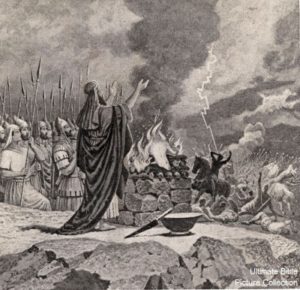 Samuel marks the occasion of the Philistine’s defeat with a stone set up between Mizpah and Shen and called it “Ebenezer,” meaning ‘Thus far the Lord has helped us’ (1 Sam 7:12). This was the same place where the Philistines originally captured the Ark (1 Samuel 4:1; 5:1). No coincidence! It was a wonderful testimony of God’s mercy bringing recovery through repentance and faith. The towns that the Philistines had captured from the Israelites from Ekron to Gath were restored to them.
Samuel marks the occasion of the Philistine’s defeat with a stone set up between Mizpah and Shen and called it “Ebenezer,” meaning ‘Thus far the Lord has helped us’ (1 Sam 7:12). This was the same place where the Philistines originally captured the Ark (1 Samuel 4:1; 5:1). No coincidence! It was a wonderful testimony of God’s mercy bringing recovery through repentance and faith. The towns that the Philistines had captured from the Israelites from Ekron to Gath were restored to them.
Samuel leads the children of Israel in 20 years of revival.
1 Samuel 7:2 2 From the day that the Ark remained at Kiriath-jearim, the time was long, for it was twenty years; and all the house of Israel lamented after the LORD. (The NIV translates this ‘mourned and sought after the Lord’).
There was peace between the Israelites and the Amorites. The Lord kept the attacks from the Philistines at bay during Samuel’s lifetime.
Samuel performed his duties as judge of Israel, traveling the circuit of cities, but he always returned home to Ramah. There he built an altar,
I think this final picture is a reminder that whatever our vocation and business may bring us, as believer priests, we are to maintain an altar of worship for our family at home.
NEW TESTAMENT READING- JOHN 6:1-21;
JESUS FEEDS THE 5000
 The feeding of the 5000 is the only miracle apart from the Resurrection of Christ that appears in all four gospels.
The feeding of the 5000 is the only miracle apart from the Resurrection of Christ that appears in all four gospels.
Jesus’ reputation as a miracle worker had drawn a large crowd to a mountainside on the far shore of Galilee, away from any food shops. The disciples suggest that they dismiss the crowd and find their own food (Mark 6:35-36). The gospels of Matthew, Mark, and Luke emphasize that the disciples were to take responsibility for feeding them. Jesus said, “You give them something to eat!” (Matthew 14:16; Mark 6:37; Luke 9:13). John states that Jesus tests His disciples by questioning them as to where they could buy bread for these people (John 6:5) and that Jesus already knew what He was going to do!
Jesus is testing how the disciples are thinking. What is their approach to problem-solving? Will they look to Him or to themselves? Will they look to what the shops can provide or what He can provide? So often, our first response is ‘what can we pay for’ instead of ‘what can God provide.’
This is how far Philip’s thinking can bring him.
John 6:7 7 Philip answered Him, “Two hundred denarii worth of bread is not sufficient for them, for everyone to receive a little.”
Andrew looks for whatever provision is at hand– the lad’s lunch of five loaves and two fish. But his estimations go only that far.
John 6:8-9 8 One of His disciples, Andrew, Simon Peter’s brother, said to Him, 9 “There is a lad here who has five barley loaves and two fish, but what are these for so many people?”
 Jesus then takes charge, instructing the crowd to be seated on the grass. The Gospel of Luke adds the detail that He instructs them to gather in groups of approximately 50. The disciples found the fish, and the loaves were miraculously multiplying as they distributed as much as the people wanted.
Jesus then takes charge, instructing the crowd to be seated on the grass. The Gospel of Luke adds the detail that He instructs them to gather in groups of approximately 50. The disciples found the fish, and the loaves were miraculously multiplying as they distributed as much as the people wanted.
The reference to groups of 50 links this event with the miraculous multiplication that takes place on the ‘harvest multiplication day’ known as ‘Pentecost’; meaning ’50th day’, when the 120 in the upper room go out on the streets and win 3000 to faith in the Risen Christ (Acts 2).
After all the five thousand men, plus women and children, had had their fill, the disciples discovered that they had more food left over than what they started with; 12 baskets full, one ‘take home’ bag of leftovers for each of the disciples, Jesus’ 12 co-workers in the miraculous feeding.
JESUS WALKS ON WATER
The miracle of Jesus walking on the water is recorded in all the gospels except Luke. The Lord knew the storm was coming. He is Lord of the storms and knew that His disciples had to face storms in their lives if they were to grow spiritually. Once again, Jesus demonstrates Who He is. Here are some observations
- Jesus perceives that the crowds want to take Him by force and make Him king (6:15a). He will not let the people make Him their mascot. They want Jesus to be king. They want Him to rule, but they do not want to be ruled. They were interested in Him granting them the food that perishes but not the food of His person and saving work that would give them eternal life.
- Jesus gravitates to solitude, communion with His Father, even in the midst of His popularity, knowing that it might disappoint His fan base (6:15b).
- The disciples head home to Capernaum on the other side of the Sea, apparently leaving Jesus to return in His time. Jesus resorts to His favorite means of transportation- walking. Except now He is walking on water. They are understandably frightened. He calls them to recognize Him for Who He is and not to be afraid. We have more than 366 admonitions in the Bible reminding us to ‘Fear not’ at least one for every day of the year, including leap year! (The actual number of “fear not’ and/or ‘be not afraid’ commandments number only 103, but the idea comes across in more verses.)
- When the disciples receive Jesus on board the boat, “immediately the boat was at the land to which they were going” (John 6:20). This is a great encouragement to those who receive Jesus into their lives on His terms. In salvation, He gets you where you need to be! “Complete in Christ Jesus”! He does this instantly, positionally.
TODAY’S READING FROM THE BOOK OF PSALMS
PSALM 106:13-31
We continue to read the unfolding story of God’s mercies to the children of Israel. He is to be praised for His everlasting kindness.
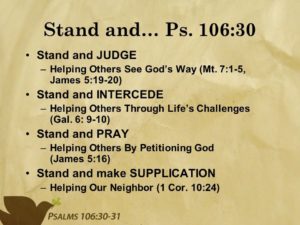 The Psalmist lists the many instances of the unfaithfulness of God’s people: They quickly forgot the wondrous work of their deliverance from Egypt, they did not wait for His counsel (103:13); they murmured about the manna, they craved the quail, they rebelled against Moses and the office of the priesthood, they worshiped the golden calf and credited their idol with the saving works of Yahweh; they despised the Promised Land, cowered in fear of giants, they forsook God’s laws of sexual morality and joined themselves to the idolatry at Baal-Peor. They compromised their obedience and failed to drive out the demon-worshipping Canaanites from the land God had given them as an inheritance. Instead, they adopted the demonic practices of the pagans.
The Psalmist lists the many instances of the unfaithfulness of God’s people: They quickly forgot the wondrous work of their deliverance from Egypt, they did not wait for His counsel (103:13); they murmured about the manna, they craved the quail, they rebelled against Moses and the office of the priesthood, they worshiped the golden calf and credited their idol with the saving works of Yahweh; they despised the Promised Land, cowered in fear of giants, they forsook God’s laws of sexual morality and joined themselves to the idolatry at Baal-Peor. They compromised their obedience and failed to drive out the demon-worshipping Canaanites from the land God had given them as an inheritance. Instead, they adopted the demonic practices of the pagans.
In the midst of the list of faithlessness, we have an example of faith in Phinehas:
Psalm 106:30-31 30 Then Phinehas stood up and interposed, and so the plague was stayed. 31 And it was reckoned to him for righteousness, to all generations forever.
Phineas stands out as an example of faith, similarly to Abraham (Genesis 15:6)
Genesis 15:5-6 5 And He took him outside and said, “Now look toward the heavens, and count the stars, if you are able to count them.” And He said to him, “So shall your descendants be.” 6 Then he believed in the LORD; and He reckoned it to him as righteousness.
TODAY’S READING FROM THE BOOK OF PROVERBS
Proverbs 14:32-33 32 The wicked is thrust down by his wrongdoing, but the righteous has a refuge when he dies. 33 Wisdom rests in the heart of one who has understanding, but in the hearts of fools it is made known.
PRAY FOR THE NATIONS
Jumhuriyah Jibuti, (Republic of Djibouti)
Africa
Geography
A hot, dry, desert enclave between Ethiopia, Eritrea, and Somalia, with possibly the hottest average temperatures of any country on earth.
Population: 879,053 Annual Growth: 1.78%
Capital: Djibouti
Urbanites: 88.1%
HDI Rank: 155 of 182 (UN Human Development Reports 2009)
Peoples
Peoples: 11 (55% unreached)
Official language: French and Arabic. Trade languages Somali, Afar Languages: 10
Religion
Largest Religion: Muslim
| Religion | Pop % | Ann Gr | |
| Christians | 15,383 | 1.75 | 0.2 |
| Evangelicals | 1,207 | 0.1 | 3.4 |
| Muslim | 852,945 | 97.03 |
Challenges for Prayer
Several evangelical fellowships exist among the immigrant groups flooding Djibouti in recent years – from Ethiopia, Madagascar, Congo-DRC, the Philippines, Eritrea, and other places. Many of these congregations share a strong spiritual burden to reach the Somali and Afar peoples. Pray that they may be relevant and effective in their witness. Pray that their own reconciliation and unity made possible in Christ might be a witness to Djibouti’s divided and hostile peoples.
The few Somali and Afar believers are often isolated and suffer many pressures from relatives. Their families may ostracize, beat or even kill them for deserting Islam. Pray that they might stand firm in their commitment to follow Jesus. Many disruptive forces such as tribalism and jealousy create division among the believers and make them reluctant to meet together. Pray for a new bond of unity. Many of the believers are jobless, and some are illiterate – pray for effective use of literacy and vocational training programs. Small groups of local believers are gathering for fellowship. Pray for effective use of the Scriptures in these meetings and for the Holy Spirit to work in each life. Pray that God will raise up strong Christian leaders from among and for the Somali and Afar believers.
PRAYER: O LORD, help us to recognize that You are the Living God, not a mere mascot or a creed to believe. We thank You for Your testimony in Christ Jesus. We are grateful for our faith union with Him. Keep us from presuming a guarantee for victory apart from trusting You moment by moment. You are Lord of the storm, and You have the power to get us through each trial with the best spiritual benefit. Keep us from any compromised obedience in our lives. In Jesus’ Name. Amen.

